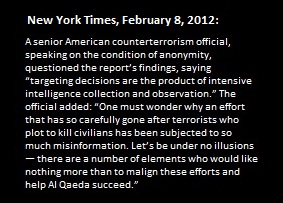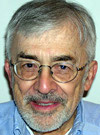| Home | Blog | Ask This | Showcase | Commentary | Comments | About Us | Contributors | Contact Us |

Why is the New York Times enabling a U.S. government smear campaign against reporters exposing the drone wars?ASK THIS | May 132, 2012The Times let government officials anonymously attack a group of journalists and a lawyer who have uncovered evidence that belies the White House's claim that drones aren't killing many civilians. Was their rationale for that justified? By John Hanrahan A human rights lawyer and a group of investigative journalists who have exposed the extensive civilian casualties from CIA drone strikes in Pakistan are being smeared by anonymous U.S. government officials, who have even accused them of being sympathetic to al Qaeda. Two of the anonymous accusations came in articles in The New York Times, despite the paper's own rules against personal attacks by unnamed sources. Pakistani human rights attorney Shahzad Akbar and the London-based Bureau of Investigative Journalism (BIJ) say the campaign is intended to deter mainstream news organizations from reporting that the White House is lying about how many innocent people are being killed by the drone strikes. President Obama's top terrorism adviser John O. Brennan recently contended that civilian deaths were "exceedingly rare." The BIJ, though, puts total drone deaths in Pakistan since 2004 at between 2,440 and 3,113, and they say between 479 and 821 of the dead were civilians, including 174 children. Drone attacks in Pakistan have dramatically increased since Obama took office: President Bush was responsible for 52; Obama for 270 and counting. Relying on the BIJ’s comprehensive research and his own investigations in support of a number of clients who are drone victims or families of victims and who are suing the CIA, Akbar has for the last two years sharply challenged U.S. government assertions regarding civilian casualties, most recently by filing two lawsuits in Pakistan, demanding a criminal investigation into the killings by Hellfire missile of some 50 people, including tribal elders in Waziristan in March 2011. (See Niemanwatchdog.org's May 10 story, Civilian drone victims, unrecognized by the U.S. government and public, seek justice.) Akbar's public criticisms of the program, including naming the CIA station chief in Pakistan and calling for his trial on murder charges for drone killings of civilians, has made him a particular thorn in the side of U.S. officials. The London-based Bureau of Investigative Journalism is a not-for-profit organization made up of former editors and reporters for major U.K. news organizations that undertakes investigations on a variety of subjects for various print and broadcast outlets in the United Kingdom and elsewhere. Akbar and BIJ senior reporter Chris Woods both spoke recently at an international drone conference in Washington, D.C., sponsored by the peace group Code Pink, the U.K.-based human rights group Reprieve, and the Pakistan-based Foundation for Fundamental Rights, which Akbar heads. Woods told the conference audience that his organization had been subjected to an anonymous smear campaign by the CIA. The agency, he said, has attacked his organization’s findings aggressively “and has asked our partners” -- newspapers and broadcasters who have collaborated with BIJ -- not to use BIJ’s reports. Two of the anonymous smears came from unnamed U.S. government sources quoted in two separate New York Times articles reporting on Akbar’s and BIJ’s findings. The writer of both stories was the Times's highly regarded national security reporter, Scott Shane. Brennan, in June 2011, asserted that in the preceding 12 months, "there hasn't been a single collateral death because of the exceptional proficiency, precision of the capabilities that we've been able to develop." In an August 11, 2011 Times article, Shane reported Akbar and BIJ's evidence to the contrary. But he also wrote: “American officials accuse Mr. Akbar of working to discredit the drone program at the behest of the Directorate for Inter-Services Intelligence, or ISI, the Pakistani spy service. Mr. Akbar and others who know him strongly deny the accusation.” Shane quoted another human rights lawyer who worked with Akbar in Pakistan and who described the anonymous charges of ISI connections as “not credible at all.” But the article also allowed unnamed officials to take a shot at BIJ: “American officials said the Bureau of Investigative Journalism report was suspect because it relied in part on information supplied by Mr. Akbar, who publicly named the C.I.A.’s undercover Pakistan station chief in December when announcing his legal campaign against the drones.” More recently, on February 8, the Times reported the BIJ’s findings that the CIA’s drone attacks in Pakistan “have repeatedly targeted rescuers who responded to the scene of a strike, as well as mourners at subsequent funerals.” But after highlighting BIJ’s report, the article then allowed a “senior American counterterrorism official, speaking on the condition of anonymity” to not just question the report’s findings, but to state: “One must wonder why an effort that has so carefully gone after terrorists who plot to kill civilians has been subjected to so much misinformation. Let’s be under no illusions -- there are a number of elements who would like nothing more than to malign these efforts and help al Qaeda succeed.” That latter direct quote essentially allowed the anonymous source to declare critics of the drone program as traitors and dupes. Shane, in written responses to a number of questions that Nieman Watchdog posed to him about the two articles, said he believes this particular quote was not necessarily directed at BIJ, calling it “ambiguous, and I wish I had been able to clarify it.” He added: “Based on all my reporting over the last couple of years, I believe U.S. government officials have in mind not BIJ or other journalists as sympathizers of Al Qaeda but militants and perhaps ISI officers who supply what they consider disinformation on strikes to journalists.” The Times’ own “Confidential News Sources Policy,” in an effort to stop the overuse or unfair use of anonymous sources, states, among other things: “We do not grant anonymity to people who use it as cover for a personal or partisan attack.” But Shane defended the use of the anonymous quotes in the two articles, saying that he and his editors agreed that the quotes were needed to give “some voice from the other side” -- that is, the government -- in articles reporting allegations of civilian deaths. Until the drone-strike program is made overt and government officials can talk more freely about it, Shane said, “journalists often have a choice of quoting anonymous officials or writing stories about accusations of bad strikes and innocent deaths and including no response at all. I feel it's important to include some voice from the other side, and my editors have agreed. In addition, it seems to me important to citizens to know what the government says, even if some citizens find the statements unpersuasive or worse.” The problem, though, with the U.S. government as the anonymous “voice from the other side,” is that the real unrepresented “voice from the other side” in the mainstream news media is that of the civilian victims. Their voices and names seldom appear in the mainstream media. Shane should be credited for writing the two articles that gave headlines and space to the drone-strike critics. But those government officials are not so oppressed that they should be allowed to anonymously trash their critics’ reputations and motivations. Readers might reasonably assume that the Times wouldn’t run such quotes anonymously and without proof unless there were some truth to them. Because the drone strikes occur in remote, inaccessible areas, Akbar said at the conference, “The CIA is the only source as to what’s happening on the ground in Waziristan,” so U.S. officials always tell western reporters that only armed “militants” were targeted and killed. Relying on that as the truth would be comparable, he said, to reporters relying on only the Taliban’s or other militants’ version of events when they “administer horrible punishment on citizens.” His goal, Akbar said, is to publicize cases of drone killings of civilians, using the names of the civilian dead, to force the “American president to admit that he is klling children and women in your name” and to show that the drone attacks “are not making America safer, because you are only creating more enemies.”
Since Shane’s response sheds light on what he describes as the dilemma of dealing with government officials on programs that are classified, but nevertheless very public, here is his response in full to our questions: “The drone program, as I have written, is in the strange category of classified but public information, which creates difficulties both for government officials and for journalists. Many outsiders and some government officials think the situation is untenable and that the program should be made overt, so that real debates could take place on Congress and the public on these issues. “In the meantime, journalists often have a choice of quoting anonymous officials or writing stories about accusations of bad strikes and innocent deaths and including no response at all. I feel it's important to include some voice from the other side, and my editors have agreed. In addition, it seems to me important to citizens to know what the government says, even if some citizens find the statements unpersuasive or worse. “In the first [August 11] story you mention, read carefully everything about Shahzad Akbar. The story subjects to scrutiny the claim that he's an ISI tool and presents evidence to the contrary. The quote in the second story is ambiguous, and I wish I had been able to clarify it. Based on all my reporting over the last couple of years, I believe US government officials have in mind not BIJ or other journalists as sympathizers of Al Qaeda but militants and perhaps ISI officers who supply what they consider disinformation on strikes to journalists. “It's interesting and useful to criticize journalists struggling with such dilemmas -- it's a sport I have often enjoyed myself -- but for a reporter this story poses real challenges without easy choices.”
|
||||||||||||||||||




